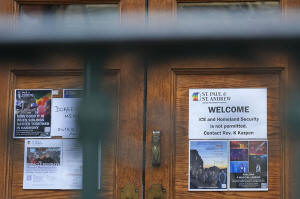Federal judge sides with Trump in allowing immigration enforcement in
houses of worship
[April 12, 2025]
By LINDSAY WHITEHURST and MICHAEL KUNZELMAN
WASHINGTON (AP) — A federal judge on Friday sided with the Trump
administration in allowing immigration agents to conduct enforcement
operations at houses of worship for now, despite a lawsuit filed by
religious groups over the new policy.
U.S. District Judge Dabney Friedrich in Washington refused to grant a
preliminary injunction to the plaintiffs, more than two dozen Christian
and Jewish groups representing millions of Americans.
She found that the plaintiffs lack standing, or the legal right to sue,
since only a handful of immigration enforcement actions have been
conducted in or around churches or other houses of worship and that the
evidence at this point doesn’t show “that places of worship are being
singled out as special targets.”
The plaintiffs are reviewing the decision and assessing their options,
said their lead counsel, Kelsi Corkran.
“We remain gravely concerned about the impacts of this policy and are
committed to protecting foundational rights enshrined in the First
Amendment and the Religious Freedom Restoration Act,” said Corkran, the
Supreme Court Director at the Institute for Constitutional Advocacy &
Protection.

The religious groups argued the policy violated the right to practice
their religion. Since President Donald Trump took office in January,
attendance has declined significantly, with some areas showing
double-digit percentage drops, they said.
The judge, though, found that the groups had not shown their drops were
definitively linked to the church policy specifically, as opposed to
broader increased actions by Immigration and Customs Enforcement or
other agencies.
“That evidence suggests that congregants are staying home to avoid
encountering ICE in their own neighborhoods, not because churches or
synagogues are locations of elevated risk,” wrote Friedrich, who was
appointed by the Republican president during his first term.
That means that simply reversing the policy on houses of worship
wouldn’t necessarily mean immigrants would return to church, she found.

[to top of second column]
|

A sign that prohibits the entrance of ICE or Homeland Security is
posted on a door at St. Paul and St. Andrew United Methodist Church
in New York, Jan. 21, 2025. (AP Photo/Seth Wenig, File)

On Jan. 20, his first day back in office, Trump’s administration
rescinded a Department of Homeland Security policy limiting where
migrant arrests could happen. Its new policy said field agents using
“common sense” and “discretion” can conduct immigration enforcement
operations at houses of worship without a supervisor’s approval.
Plaintiffs’ attorneys claimed the new Homeland Security directive
departs from the government’s 30-year-old policy against staging
immigration enforcement operations in “protected areas” or
“sensitive locations.”
The plaintiffs did offer a handful of examples of enforcement or
surveillance, according to the judge's ruling. They cited reports of
an immigrant arrested at one Georgia church and of an Immigration
and Customs Enforcement search at a Georgia church day care center.
The plaintiffs also cited four cases of immigration officers
appearing to conduct surveillance near faith-based sites, such as
photographing people in line for food.
The ruling comes as Trump’s immigration crackdown hits courtrooms
around the country. On Thursday alone, another judge cleared the way
for the administration to require people in the country illegally to
register with the government even as the Supreme Court ordered the
administration to work to bring back a man mistakenly deported to
prison in El Salvador.
There have been at least two other lawsuits over that sensitive
locations policy. One Maryland-based judge agreed to block
immigration enforcement operations for some religious faiths,
including Quakers.
A judge in Colorado, though, sided with the administration in
another lawsuit over the reversal of the part of the policy that had
limited immigration arrests at schools.
Despite the immediate setback, the plaintiffs can continue to press
their case in the lawsuit.
All contents © copyright 2025 Associated Press. All rights reserved |